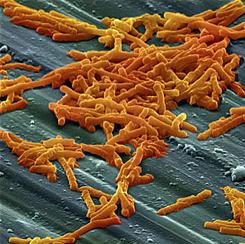 It is well known that infants rely on their mothers for food and nutrients in their early years. However, the effect that the hormones in this food have on an infant's development has not previously been known. Recent research conducted at the University of Colorado, Anschutz Medical Center has shown that hormones in human breast milk contribute to the health of the feeding infant. (Image by Voiceboks via Wikimedia Commons)
It is well known that infants rely on their mothers for food and nutrients in their early years. However, the effect that the hormones in this food have on an infant's development has not previously been known. Recent research conducted at the University of Colorado, Anschutz Medical Center has shown that hormones in human breast milk contribute to the health of the feeding infant. (Image by Voiceboks via Wikimedia Commons)
Tags: University of Colorado, Anschutz Medical Campus, CO, Fitz, Aurora, 2016, BioResearch Product Faire, Western, gut bacteria, Gammaproteobacteria, Breast milk

Clostridium difficile, more commonly referred to as C. diff, is a bacteria that makes half a million American's sick each year, and is responsible for over 25,000 deaths annually, both directly and indirectly. The bacteria can lead to serious illnesses in the gut, that can cause diarrhea and colon inflammation. Often times, C. diff infections can be caused by the over use of antibiotics, which affect the healthy bacteria in the gut and provide opportunity for C. diff bacteria to grow in that area.
Researchers from the University of Michigan, Ann Arbor have received a five-year, $9.2 million grant from the National Institute of Allergy and Infectious Diseases to further study C. diff, to learn more about it with the aim of developing new treatment methods. (Image of C. diff bacteria courtesy of Cjc2nd via Wikimedia Commons)
Read More
Tags: University of Michigan, Midwest, Ann Arbor, BioResearch Product Faire Event, MI, UMich, 2016, Clostridium difficile, C. diff, C. difficile, Bacteria, gut bacteria

